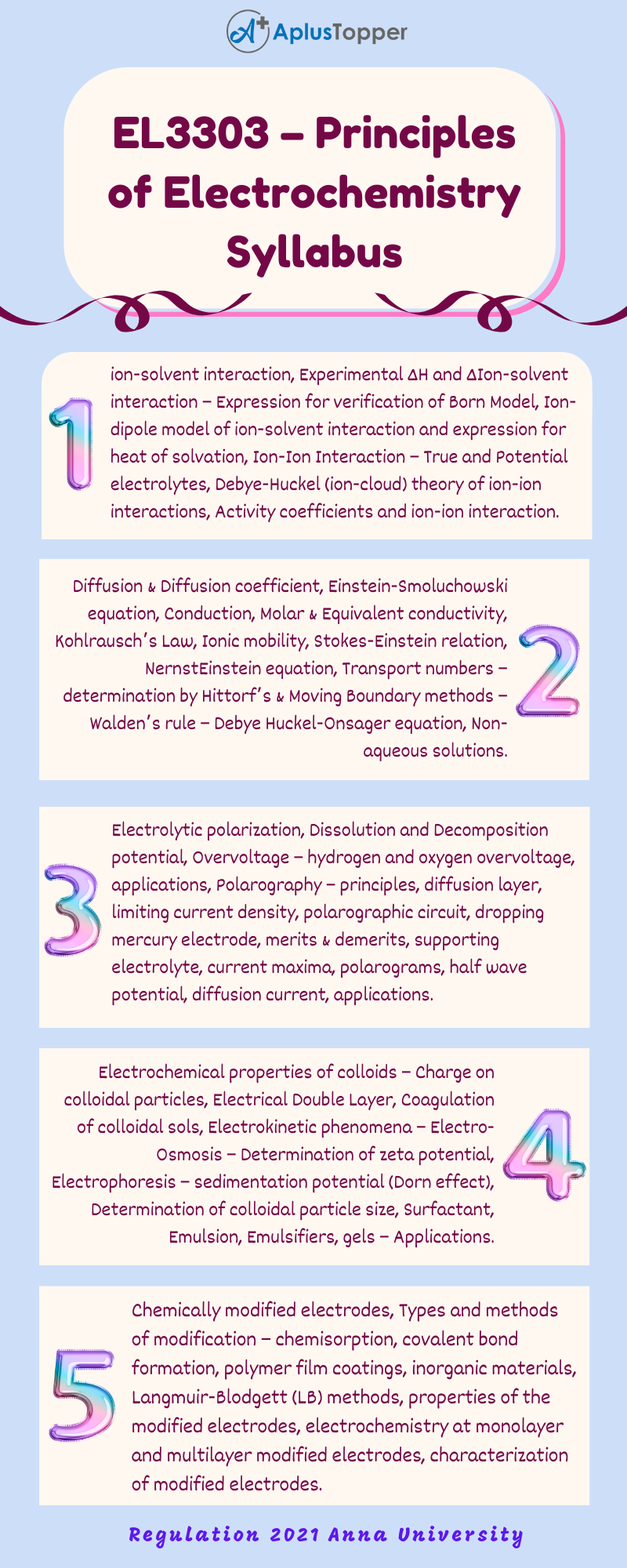Welcome to our website. We are glad to provide the Semester III subject Principles of Electrochemistry of B. Tech. Chemical And Electrochemical Engineering, Anna University Syllabus. In this article, we included the required information regarding the syllabus. Let’s see more…
We aim to give the semester III EL3303 – Principles of Electrochemistry Syllabus to avoid confusion about the unit-wise syllabus. You can take notes from it. And Prepare strategies on how to read, from where to read, etc… It will become easy to learn about several topics. We included the required references and textbooks. Hope this information is useful. If you have any doubts regarding the syllabus please comment below. Never forget to share with your classmates.
If you want to know more about the B. Tech. Chemical And Electrochemical Engineering Syllabus connected to an affiliated institution’s four-year undergraduate degree program. We provide you with a detailed Year-wise, semester-wise, and Subject-wise syllabus in the following link B. Tech. Chemical And Electrochemical Engineering Syllabus Regulation 2021 Anna University.
Aim Of Objectives:
- To import knowledge on basic principles of electrochemistry and its applications.
EL3303 – Principles of Electrochemistry Syllabus
Unit – I: Ion-Solvent & Ion-Ion Interactions
ion-solvent interaction, Experimental ΔH and ΔIon-solvent interaction – Expression for verification of Born Model, Ion-dipole model of ion-solvent interaction and expression for heat of solvation, Ion-Ion Interaction – True and Potential electrolytes, Debye-Huckel (ion-cloud) theory of ion-ion interactions, Activity coefficients and ion-ion interaction.
Unit – II: Ion Transport In Solution
Diffusion & Diffusion coefficient, Einstein-Smoluchowski equation, Conduction, Molar & Equivalent conductivity, Kohlrausch’s Law, Ionic mobility, Stokes-Einstein relation, NernstEinstein equation, Transport numbers – determination by Hittorf’s & Moving Boundary methods – Walden’s rule – Debye Huckel-Onsager equation, Non-aqueous solutions.
Unit – III: Polarisation And Over Potential
Electrolytic polarization, Dissolution and Decomposition potential, Overvoltage – hydrogen and oxygen overvoltage, applications, Polarography – principles, diffusion layer, limiting current density, polarographic circuit, dropping mercury electrode, merits & demerits, supporting electrolyte, current maxima, polarograms, half wave potential, diffusion current, applications.

Unit – IV: Colloidal Electrochemistry
Electrochemical properties of colloids – Charge on colloidal particles, Electrical Double Layer, Coagulation of colloidal sols, Electrokinetic phenomena – Electro-Osmosis – Determination of zeta potential, Electrophoresis – sedimentation potential (Dorn effect), Determination of colloidal particle size, Surfactant, Emulsion, Emulsifiers, gels – Applications.
Unit – V: Electroactive Layers And Modified Electrodes
Chemically modified electrodes, Types and methods of modification – chemisorption, covalent bond formation, polymer film coatings, inorganic materials, Langmuir-Blodgett (LB) methods, properties of the modified electrodes, electrochemistry at monolayer and multilayer modified electrodes, characterization of modified electrodes.
Text Books:
- J.O.M.Bockris & A.K.N.Reddy, “Modern Electrochemistry –Vol. I & II”, Plenum Press, New York, 2000.
- Peter Atkins and Julio de Paula, “Physical Chemistry”, VII Edition, Oxford University Press, New York, 2002.
References:
- A.J. Bard and L.R. Faulkner, “Electrochemical Methods – Fundamentals and Applications” 3rd edition John Wiley & Sons Inc, 2001.
- Pallab Ghosh,” Colloid and Interface Science”, PHI Ltd,2009.
Related Posts On Semester – III:
- MA3356 – Differential Equations
- CH3351 – Chemical Process Calculations
- EL3301 – Heat Transfer and its Applications
- EL3302 – Fluid and Solid Operations
Also Check:
